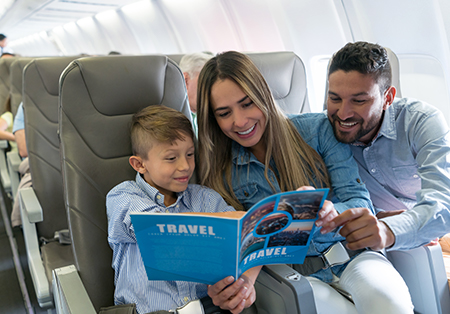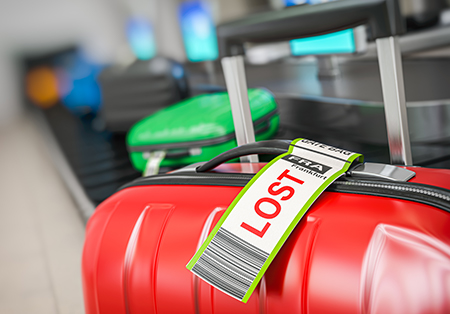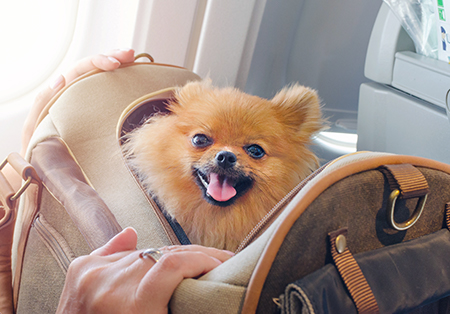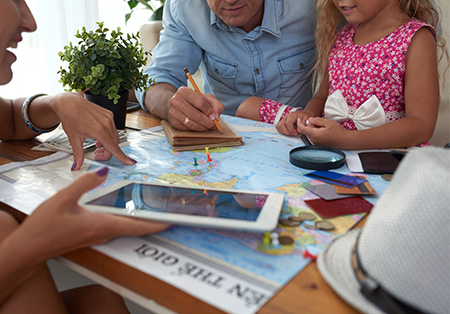Planning a vacation, trip, or even extended travel? Make every moment count with our free vacation calculator. By thinking about what you really care about and what you don’t, you’ll end up with the perfect trip at a much lower price.
You might even have enough left over for some extra time away!




Start saving right away
As you start putting your travel plans together, these three simple tips can help you save on just about everything — flights, lodging, rental cars, and everything in between.
- Start planning your trip early.
Flights and hotel rooms are much cheaper when you plan ahead. Popular venues and special events also fill up early, sometimes weeks or months ahead of time. The more time you give yourself to plan, the more you can save and the farther your budget will go.
- The best deals aren’t always the best.
When booking flights, lodging, rental cars, and more, be careful to read the fine print and consider the taxes or “extras” that might not be included.
Does that cheap rental car include unlimited mileage? Will that flight make everyone in your party pay to check extra bags? Does that hotel room price include taxes and fees?
Take some time to read carefully and consider all your options before you rush to grab a deal that might not be such a deal after all.
- Be creative in searching for bargains.
Travel websites ask you to select the number of people in your party before you start a search. Instead, start by searching for one person and see what you find.
You might be able to get a cheap flight or hotel for two people, but not for four. If that’s the case, consider booking your plans in two groups of two. Play around with different searches and explore your options before you make any final decisions.
You’ll have to decide for yourself how important it is to fly and sit together, but you might be able to save a lot of money by traveling separately and grouping up once you arrive.
- Get a consolidated view of your finances
- Maximize your savings
- Manage your money with confidence
Flights
The price of airfare and other public transportation is back on the rise after previous cuts of 28% or more.
Still, there are plenty of deals to be had, especially with some planning and travel flexibility. Use these tips to make the most of your flight budget so you can splurge a little more in other places.

Tips for saving on getting there
- Be flexible in your dates
Your trip dates can significantly affect the price of airfare. For example, it’s often less expensive to fly midweek or to include a weekend in your stay. Many search platforms let you choose flexible travel dates. Take advantage of this option to see all your choices.
- Be flexible in your destination
If your travel plans are taking you a bit off the beaten track, compare the cost of flying into a small, local airport vs. flying into a large metropolitan area and making your way to your final destination via ground transportation.
Also, direct flights are sometimes more expensive than flights with one or even two stops. As long as you build enough time to change flights into your itinerary, the cost savings might be worth it.
- Search across different sites and platforms
Not only do different sites sometimes offer different rates, but searching on mobile devices might present different rates than searching on your computer — even on the same travel site.
- Set up alerts
If you’ve given yourself enough lead time to wait on those reservations — or if you’ve already made reservations with no cancelation fee — sign yourself up for trip alerts across different travel sites to get deal notifications.
Travel insurance
The cost of travel insurance varies widely, depending on the potential trip events you want to cover. These can include things like:
- Canceling your trip for a covered emergency
- Emergency medical coverage overseas
- Delayed or lost baggage
- Losses due to travel delays
- Rental car damage or theft
Decide before you leave what kind of coverage you want, and be sure to shop around for a reputable insurance company with the right coverage and reasonable prices.
Also, before you buy, look into the benefits that come with your credit cards or association memberships. You might be covered for certain eventualities automatically.

Transportation
When you’re planning that vacation, remember that transportation includes more than your plane ticket. It also includes things like:
- Parking your car at the airport
- Getting from the airport to your lodgings
- Local travel at your destination
If you’re planning to visit local historic sites or tour outlying neighborhoods, you’ll need a way to get there. Investigate local travel before you leave to see if there are good public transportation options or if you’ll need a rental car.

Lodgings
Whether you’re planning to find a hotel or track down the perfect vacation rental, taking the time to research your options can save you a lot. With so many choices available, especially in the rental market, you might even find something unique to make your trip the perfect getaway.
These tips for estimating the cost of your vacation lodging can help you make the most of your money without any unwelcome surprises to blow your budget.

Tips for saving on a hotel or other lodgings
- Estimate your lodging cost.
Your cost per night will vary a lot depending on your destination and how many people you need to house. Hotels in Bangor, Maine, will be less expensive than hotels in Manhattan or Honolulu.
To get a good range of prices for your particular destination, search hotel aggregation sites like Expedia as well as rental aggregators like Airbnb and VRBO.
Finally, remember to think about the number of travelers and how many rooms you’ll need. Three couples, for example, will need 3 hotel rooms but only one vacation rental that sleeps 6.
- Include taxes, fees, and tips.
When you’re pricing your lodgings, be sure to include all taxes and fees. Hotels are notorious for leaving these out of their quoted rates. Private rentals can also include things like cleaning fees that will raise the total price of your stay.
Once you start adding together all these incidentals, private rentals can look more and more appealing. If you decide to go that route, search for premium hosts with high ratings to be sure you’ll have a great experience.
- Look for bundles and discounts.
Some hotels include breakfast, which can significantly reduce the overall cost of your meals — especially if you load up in the morning and eat a light lunch.
Places like theme parks or all-inclusive resorts offer packages that bundle everything together including all your food and lodging costs, your entertainment, and even your transportation.
Keep these in mind as you add up your budget. As expensive as those packages look, they’re often better deals than paying for everything separately.
Finally, think about the organizations you belong to, from alumni associations to AAA and AARP. Do any of them offer trip discounts with certain hotel chains? What about military discounts or age-based discounts?
Similar discounts can also apply to food and entertainment options, so remember to take advantage of them wherever you can!
Take control of your finances!- Get a consolidated view of your finances
- Maximize your savings
- Manage your money with confidence
- Consider your ground transportation costs.
Are you renting a car at your destination to get around? What about taking taxis? Riding the subway or local buses? Catching rides through Uber?
If you’re staying at a more expensive hotel in a downtown area, you might be able to save some money by using free hotel transportation from the airport and then walking or taking local public transportation. Research the sights you want to see so you can plan how to get there.
In considering a rental car, remember that there are often taxes and fees there too, not to mention the cost of parking. Hotels in the suburbs and vacation rentals often include a place to park for free, but you should expect to pay for parking if you’re headed downtown. Even your hotel will probably charge a parking fee per night.
- Book early when you can, or consider a non-refundable rate.
If you’re traveling during a busy season, try to book your stay early at a refundable rate in case you need to cancel. Prices tend to rise as the season gets closer and rooms fill up.
You can also save money by prepaying for a non-refundable rate, but don’t make that commitment too far in advance. If you have any doubt about the trip, be sure to book lodgings that will let you cancel your plans without a penalty.
On the other hand, if you’re traveling during the off-season, some hotels lower their prices for dates that aren't fully booked. Consider making your reservations at a refundable rate and checking in as your travel date approaches to see if the prices have dropped.
- Remember to check with your personal network!
Do you have friends with a lake house or vacation home? What about a rental property that stays vacant during the off-season?
If you care more about taking a vacation than where you go, be sure to see what your friends might have available.
Do you have close friends who live in a different part of the country? Consider a vacation swap! In exchange for pet sitting or house sitting for each other, you can both enjoy free lodgings as you explore a new city.
Food
It’s easy to overlook the food cost involved with traveling. After all, you were going to eat either way, right? Still, there’s a world of difference between grabbing a handful of crackers out of your cabinet at home and ordering midnight French fries from room service at $18 a pop.
Since sampling new cuisine is a big part of any traveling adventure, these tips can help you grab that experience with both hands — without breaking your vacation budget.

Tips for saving on the cost of food per day
- Estimate your food costs.
When traveling in the U.S., the average person spends about $33 each day on food, most of it in restaurants. For international travelers, it’s more like $35 per day. And, of course, those costs are per person — and only an average.
If you’re traveling to an expensive destination like Manhattan or Honolulu, you can expect to double that amount easily, especially if you aren’t watching the bill. Add in a couple of kids who suddenly get hungry in the hotel room late at night, and your room service or mini-bar snacks can send that number through the roof.
Fortunately, you can bring that number down considerably with a little planning (or an all-inclusive package).
- Bring your own food for the flight.
Even if you’re a traveling foodie, your local airport probably isn’t the culinary destination you had in mind. Skip the lines and the sky-high prices by bringing your own snacks for the plane.
Of course, airplane snacks do require their own planning. Liquids still won’t pass the security check, and you can’t bring a knife to cut that hard salami. But finger foods are a great way to save money before your vacation even gets off the ground.
- Hit the local grocery at your destination.
When you’re putting together a food budget for your vacation, think about the meals that aren’t included with your lodgings. Do you need to cover your own breakfasts? Lunches? Dinners? Snacks? What about coffee or drinks?
Room service and minibars are one of the fastest ways to blow your vacation budget if you don’t plan ahead. Of course, that doesn’t mean you shouldn’t do it. Many people choose to make room service part of every trip at least once. Just make sure you’ve considered it so you can build that expense into your budget.
For most meals, you can save money and enjoy more of the local flavors by staying off the beaten track. Visit the local grocery and look for things like pre-made sandwiches or hot bars to see what’s popular. Avoid tourist traps and explore local restaurants full of new delicacies to sample — and brand new favorites.
- Think about your alcohol budget.
Your alcohol budget will be entirely unique to you and the nature of your vacation. Just remember to think about it as you’re planning your trip.
Hotel bars can be astronomically expensive, and minibars are just as bad. Rather than counting on those conveniences, consider exploring stores at your destination for local micro-brews or vineyard offerings.
Activities
Whether you want to tour ancient ruins while you’re on vacation, visit local museums, or just take the kids on a side trip to the zoo, those costs can add up quickly. Be sure to think about what you want to do on your vacation and plan ahead for those expenses.

Tips for saving money on vacation activities
- Consider buying tickets in advance
Buying tickets in advance, or in bundles, often comes with reduced rates — not to mention saving you time standing in line when you arrive.
Investigating those local activities ahead of time is also a great way to start enjoying your vacation before you even get there!
- Check out local brochures for deals
For side ventures and day trips, be sure to check out the brochures at your hotel or in local travel and tourism centers. They usually offer coupons, and you’re sure to discover options you didn’t even know existed.
- Consider all-inclusive packages
If your vacation is starting to look too expensive as you add up all the incidentals, consider looking into all-inclusive vacations at resorts or theme parks. The more you know about the real price of your vacation, the better these packages might look.
Miscellaneous costs
When you’re going on vacation, it’s easy to forget the little things. Tweezers. Nail clippers. Contact lens solution. But what’s true for packing is just as true for costs and fees.
Things like kenneling the dog, upgrading your hotel internet, and tipping just about everyone can really add up. Here’s a list to help you think through some of the things you might be overlooking in your budget.

- Check for benefits you might already have
Some credit cards offer special travel benefits like deals or refunds on flight incidentals, membership in airline lounges (with free food), late checkout options at hotels, or automatic rental car insurance. Be sure to make the most of those benefits.
-
Remember tips and “incidentals.”
Many hotels offer free wifi, only for you to discover that the free version is slow as molasses and that the “upgraded” version costs $10 per night or more. If you’re planning on streaming data in your hotel room at night, be sure to factor that in.
Also, remember to include a tip fund for baggage assistance, cleaning services, valets, wait staff, and even food delivery.
-
Pet-related costs
Last, but certainly not least, don’t forget to include the cost of your pets when it comes to travel, whether that means paying for a kennel or paying additional fees for pet-friendly lodgings.
One great money-saving solution is to swap dog sitting services with a friend if they’re not vacationing at the same time you are.
If you’re bringing your dog, be sure to confirm that your lodgings are pet-friendly, and keep in mind that pet-friendly accommodations often charge an extra cleaning fee.
What’s the most important money-saving vacation tip of all?
The best way to save money on any vacation is to plan your vacation budget and save up for it ahead of time. Even if you don’t have every penny you need before you go, the less you need to put on credit cards, the less interest you’ll pay — which means the less your vacation will really cost you.
With a personal finance app like Quicken or Simplifi by Quicken, you can plan your savings, track your goals, and build your vacation budget with confidence.

- Get a consolidated view of your finances
- Maximize your savings
- Manage your money with confidence